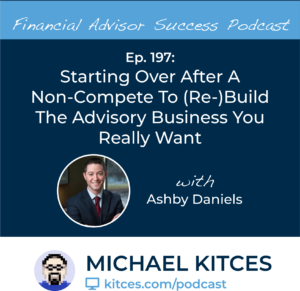Enjoy the current installment of "Weekend Reading For Financial Planners" – this week's edition kicks off with the news that barely 2 months after Charles Schwab made waves by offering (MoneyGuidePro) financial planning software directly to their consumer clients for free, Bank of America is launching a similar solution, dubbed "Life Plan", that will be made available to their clients directly and provide them the opportunity to create and track progress towards their own goals (and then contact a Bank of America/Merrill Lynch human financial advisor if they want further advice).
Also in the news this week is the official closing of the "Schwabitrade" merger of Charles Schwab and TD Ameritrade (but only the beginning of what is anticipated to be an 18 - 36 month integration process, and many open questions about exactly what TDA software and systems will remain, or not), and the revelation that Goldman Sachs has been quietly recruiting talent for what appears to be its own soon-to-be-launched RIA custody offering on the back of its recent Folio Financial RIA custodial acquisition earlier this summer.
From there, we have several investment articles this week, including the news that Morgan Stanley is acquiring mutual fund manager Eaton Vance as the consolidation of asset managers continues (though the real story may be the fact that more than half of Eaton Vance assets are in Parametric's 'direct indexing' and ESG-customized portfolios as the 'next big thing' after mutual funds?), a recent industry survey finding that while only a small segment of clients are focused on ESG investing the ones who are appear to be far more likely to refer their financial advisor (who delivers well on social investing) to their own friends and family, and a recent investing poll finding that while new investing apps like Robinhood and Acorns have been highly controversial they may be single-handedly cutting the racial and age gaps in individual stock ownership (albeit with a concerning about of leverage and margin investing!).
We've also included a number of articles on the challenging theme of customization and personalization in the digitally based pandemic era, including a fresh look at how you scale the "special" of your advisory firm while maintaining personalization (hint: instead of providing customized advice for each different client, create a customized advice process for a unique type of client and then focus on serving that differentiated clientele), what it takes to create intimacy in a digital world (hint: it's all about personal connection), and the real-world challenges that remain in trying to create intimacy in a virtual environment (and why the future of the financial advice business may be all about the things that we can uniquely only do in an in-person relationship).
We wrap up with three interesting articles, all around the theme of learning and new ideas: the first looks at how new ideas and innovation occur within a business, where it's not enough to have a visionary or 'genius' who can create new ideas, but also the social 'butterflies' who help propagate new ideas across the company so they're actually implemented; the second explores a new research study finding that we're far more likely to learn lessons from our experiences when we control the decision about which path to pursue in the first place; and the last examines the awkwardness of feeling like a "noob" (newbie) when trying something out for the first time, and why even though it's natural to want to avoid those feelings of awkward "noobness", that in the end the only way we ever improve is to create (and then push through) those feelings of awkwardness on the path to learning something new!
Enjoy the 'light' reading!




